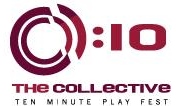THE FOOD HERE IS MIXED…AND SUCH SMALL PORTIONS
One thing you’ve got to love about this festival of ten minute plays: When they’re done correctly, these vignettes are like plates of tapas, each fully formed and complete, but in miniature. The only question is whether they’re tapas plates from that wonderful Spanish restaurant in the Village, which has been around since 1920, or whether they’re supermarket tapas, served on microwave trays and full of horrendous preservatives. The answer for Evening A of Collective NY’s Ten Minute Play Fest – with its slick presentation, crisp writing, and ferocious pacing – falls somewhere between the two metaphors: It’s like plates of tapas from a modern Spanish restaurant where some of the little plates are amazing, while others contain ingredients that don’t quite work together.
Probably the most engaging and downright most humorous of the pieces is playwright Phillip Hall’s thoroughly delightful No Sugar, in which a hard-boiled but flirty truck-stop diner-waitress (Margaret Champagne) tries to woo a burly trucker (Chris Sullivan), who is simply not having it. The repartee between Champagne and the deadpan, deceptively flat-faced Sullivan is charming, abetted by Hall’s sprightly dialogue and director Karen Chamberlain’s sassy staging.
Craig McNulty’s May First Twenty Eleven examines the complex mix of emotions of a pair of brothers, sons of a father who perished in the 9/11 attack. The vignette takes place on the day that Osama Bin Laden is killed in Pakistan, and contrasts the gleeful bloodthirsty enthusiasm of brother Alex (Chris Beetem) with the more muted, reserved grief of brother Brian (Swann Gruen). The siblings’ interplay is nicely handled in director Margaret Champagne’s intimate and moody staging, but we can’t help but wish that the play’s premise had opted for a more timeless context: The 9/11 backdrop reduces the work to melodrama and inevitably comes across as dated. Still, as a portrait of the different ways grief and relief interact – and as a description of how there’s no such true thing as emotional “closure” – the piece particularly benefits from Gruen’s likably vulnerable turn.
Craig Nobbs’ Morning is Broken concerns a man (Mike Houston), awakening from a drunk debauch, gradually learning of his appalling behavior the previous night via a report from his astonishingly supportive roommate (Booker Grant), who nurses an unrequited devotion for him. Director Eddie Kaye Thomas’s staging crafts a sensitive, almost therapeutic mood, which engenders sympathy for the play’s damaged central characters, but the plot is too slender, even for a 10-minute vignette – and the shifting motivations for the characters’ actions tend to feel needlessly aimless.
In playwright Greg DePaul’s Joe and Becca, a married couple squabbles over the best way to convince the man’s harridan mom to fork over a family inheritance. Oscar-winning actress Ellen Burstyn co-directs this vignette (with Jacqueline Knapp), and a snappy flair and wit crackle beneath the characters’ interactions. Notable here is the hysterically tightly wound performance given by Michael Billingsley as the increasingly frustrated husband. However, DePaul tries to keep too many narrative balls in the air simultaneously, with the result that the 10 minutes feel cluttered, confusing, and a little scattershot.
Probably the two least substantial works are those dealing with the metaphysical. Dave Hanson’s Exit Interview takes place in limbo, where a recently deceased gentleman (Daniel O’Shea) discovers that the gatekeeper to the afterlife is none other than his father’s prissy secretary (Nina Mehta), whom he remembers from childhood. Although director Eddie Kaye Thomas’s staging captures the weirdness of the situation, the premise itself is annoyingly random: Mehta’s world-weary, yet strangely sensitive angelic administrative assistant is charming in her undersketched part. Finally, Thomas C. Dunn’s awkward thriller Faith on a Tuesday features a mentally ill man (Dane Alexander) who holds his brother Khalil Muhammad hostage during a long night of terror. Our suspicion, thanks to the angry mood with which director Robert Z. Grant’s production is suffused, is that the two actors are depicting aspects of the same man’s inner psyche – a notion that the 10-minute context really doesn’t have time to develop and which is only subtly hinted at by the performers’ rather broad, bawling performances.
In this sort of collection, one must not look for a unifying underlying theme – except, perhaps, for a certain standard for the acting and directorial skills. However, the works are all noteworthy in their accessibility: Some of the skits play as full narratives, albeit shorter, while others establish a situation but then end before full fleshing it out into a story. Here’s the truth, though: If you don’t like a play on this bill, just wait around ten minutes and the waiters will bring out another plate.
10 Play Festival, Program A: The Odds
The Collective NY
McGinn/Cazale Theater, 2162 Broadway at 76th Street
played through October 13, 2013
for info, visit http://wwwCollective10fest.com
